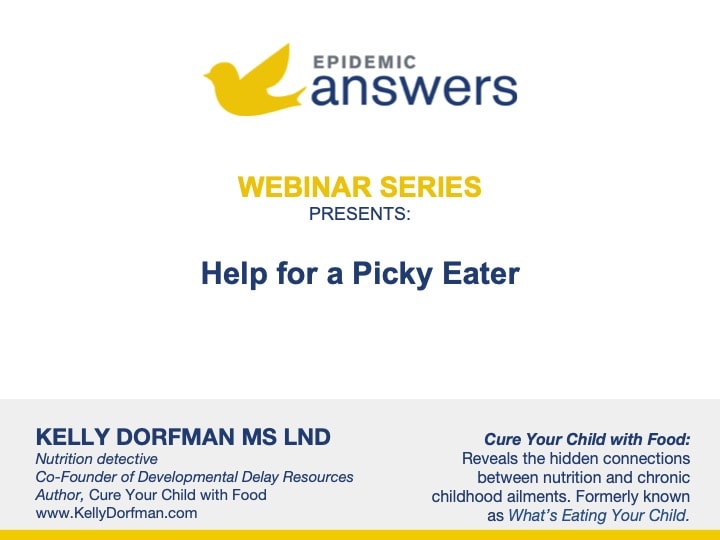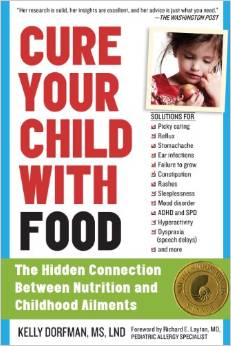Kelly Dorfman, MS, LND discusses myths, rumors and straight scoop about the gluten-free, casein-free diet.
The gluten-free casein free diet, otherwise known as “the diet,” is finally receiving well-deserved attention. Many families are now aware of its potential benefits. However, word-of-mouth dissemination has caused some confusion.
Here is the straight scoop on the most common rumors surrounding this powerful tool for eliminating symptoms of Sensory Processing Disorder, ADHD, autism and other developmental delays.
Rumor: If your child is not doing well on “the diet,” you are not being strict enough.
Straight Scoop: One third of children with developmental issues appear to be strong responders to the diet. They demonstrate many clear positive behavioral changes. Another third or more are non-direct responders. They may sleep better or their ability to engage may improve. When a response is delayed or when other interventions are in effect, progress cannot be attributed solely to the diet.
One third of the children do not appear to benefit. They may indeed be improving but in ways that cannot be measured. Results could be misleading because the diet alone does not correct other metabolic issues that may be hindering the children’s progress. Still, considering all factors, many children do not respond.
Rumor: Gluten and casein markers are sometimes found in the urine of children who have been eliminating these substances for months. Urine tests, therefore, are useless.
Straight scoop: All laboratory tests have limitations. One problem with urine screening for gluten- and casein-related peptides is that there are other foods with similar protein structures. Corn proteins, for instance, may confound the test. Soy’s structure is also similar to casein’s.
When children avoid cow’s milk but substitute soy products, the soy protein can fool the test. Many people who react to milk protein are also sensitive to soy. Using coconut milk, rice milk or nut milk might be a better alternative. Just be careful not to use too much milk substitute.
Children with oral motor problems often prefer drinking to eating their calories. Chewing is an important oral activity for them.
Rumor: When a child doing well on the GF/CF diet has a bit of wheat or dairy, the result is permanent regression.
Straight scoop: Some children regress when they consume even the most-minute amount of gluten or casein. Luckily, they represent a small percentage of positive dietary responders. Most youngsters can bend the diet in some ways at some times with few ill effects.
However, just because a little gluten can be tolerated once a week does not mean the diet is not necessary. The best way to find out what suits your particular situation best is to experiment.
When children regress with dietary indiscretions, they can usually regain lost ground. Regression is a wake-up call alerting us that gut function is weak and needs more attention.
It is important to support the gut with extra nutrients, including vitamin A, good bacteria, digestive aides and pathogen killers. A GF/CF diet alone does not correct an underlying imbalance.
Rumor: If a child is GF/CF, taking enzymes to digest peptides (like gluten and casein) is unnecessary.
Straight scoop: “The diet” will reduce, not eliminate, the complex peptide load. Digestive enzymes with DPP-IV are designed to help specifically with gluten and casein. They can also help with related proteins found in other grains and legumes.
Many children do only marginally well on other grains or eat mostly gluten-free starches, so they need extra digestive support. The right digestive enzyme can improve the appetite and is an important part of a gut-support program.
Rumor: All grains have some gluten, so it is best to avoid them all.
Straight scoop: All grains and potatoes contain complex structures related to gluten. An impaired digestive tract processes many foods inefficiently. Sometimes parents conclude that their child does best eating nothing at all!
Variety in the diet is critical for keeping allergy response down. Use as many non-gluten grains and legumes as possible. If a child seems to react to one, try it in a different form before limiting the diet further. Popcorn, for instance, may cause a reaction but corn on the cob may not.
Bottom line: When sorting through all the information on “the diet,” remember that every child is different, so one approach does not suit all. The GF/CF regimen requires discipline and commitment. Don’t berate yourself over mistakes that are bound to happen. Trial and error is unavoidable and can be useful. What you definitely want to avoid is trial and terror.
About Kelly Dorfman MS LND
Kelly Dorfman is one of the world’s foremost experts on using nutrition therapeutically to improve brain function, energy and mood. Kelly’s special talent for integrating information from many sources and finding practical solutions has made her a popular speaker and workshop leader. She lectures extensively and is a member of Platform (formerly the National Speakers Association) and has been featured on numerous television programs including CNN’s American Morning.
Kelly’s award winning book, Cure Your Child With Food: The Hidden Connection Between Nutrition and Childhood Ailments (formerly known as What’s Eating Your Child) was given rave reviews by Publishers Weekly and the Washington Post.

As a go-to expert on nutrition issues, Kelly is frequently interviewed and quoted in the media. She has been featured in articles in The Wall Street Journal, Parade, Bethesda magazine, Living Without magazine, and the Huffington Post.
Kelly holds a master’s degree in nutrition/biology and is a licensed nutrition dietitian. She is a co-founder of Developmental Delay Resources, which has merged with Epidemic Answers. You can find out more about Kelly and her practice at kellydorfman.com
Still Looking for Answers?
Visit the Epidemic Answers Practitioner Directory to find a practitioner near you.
Join us inside our online membership community for parents, Healing Together, where you’ll find even more healing resources, expert guidance, and a community to support you every step of your child’s healing journey.
Sources & References
Adams, J.B., et al. Comprehensive Nutritional and Dietary Intervention for Autism Spectrum Disorder-A Randomized, Controlled 12-Month Trial. Nutrients. 2018 Mar 17;10(3).
Cekici, H., et al. Current Nutritional Approaches in Managing Autism Spectrum Disorder: A Review. Nutr. Neurosci. 2019;22:145–155.
El-Rashidy, O., et al. Ketogenic Diet versus Gluten Free Casein Free Diet in Autistic Children: A Case-Control Study. Metab. Brain Dis. 2017;32:1935–1941.
Epstein, S.S. Unlabeled milk from cows treated with biosynthetic growth hormones: a case of regulatory abdication. Int J Health Serv. 1996;26(1):173-85.
Ghalichi, F., et al. Effect of Gluten Free Diet on Gastrointestinal and Behavioral Indices for Children with Autism Spectrum Disorders: A Randomized Clinical Trial. World J. Pediatr. 2016;12:436–442.
Hadjivassiliou, M., et al. Gluten sensitivity: from gut to brain. Lancet Neurol. 2010 Mar;9(3):318-30.
Hartman, R.E., et al. Dietary Approaches to the Management of Autism Spectrum Disorders. Adv. Neurobiol. 2020;24:547–571.
Herbert, M.R., et al. Autism and Dietary Therapy: Case Report and Review of the Literature. J. Child. Neurol. 2013;28:975–982.
Hsu, C.-L., et al. The Effects of a Gluten and Casein-Free Diet in Children with Autism: A Case Report. Chang Gung Med. J. 2009;32:459–465.
Julian, T., et al. Gluten sensitivity and epilepsy: a systematic review. J Neurol. 2018 Aug 23.
Juntti, H., et al. Cow’s milk allergy is associated with recurrent otitis media during childhood. Acta Otolaryngol. 1999;119:867–873.
Karakula-Juchnowicz, H., et al. The Food-Specific Serum IgG Reactivity in Major Depressive Disorder Patients, Irritable Bowel Syndrome Patients and Healthy Controls. Nutrients. 2018 Apr 28;10(5). pii: E548.
Karakula-Juchnowicz, H., et al. The role of IgG hypersensitivity in the pathogenesis and therapy of depressive disorders. Nutr Neurosci. 2017 Feb;20(2):110-118.
Knivsberg, A.M., et al. A Randomised, Controlled Study of Dietary Intervention in Autistic Syndromes. Nutr. Neurosci. 2002;5:251–261.
Lee, R.W.Y., et al. A Modified Ketogenic Gluten-Free Diet with MCT Improves Behavior in Children with Autism Spectrum Disorder. Physiol. Behav. 2018;188:205–211.
Lionetti, E., et al. Gluten Psychosis: Confirmation of a New Clinical Entity. Nutrients. 2015 Jul 8;7(7):5532-9.
Marí-Bauset, S., et al. Nutritional Impact of a Gluten-Free Casein-Free Diet in Children with Autism Spectrum Disorder. J. Autism Dev. Disord. 2016;46:673–684.
Martin, V.T., et al. Diet and Headache: Part 1. Headache. 2016 Oct;56(9):1543-1552.
Matthews, J.S., et al. Ratings of the Effectiveness of 13 Therapeutic Diets for Autism Spectrum Disorder: Results of a National Survey. J Pers Med. 2023 Sep 29;13(10):1448.
Nsouli, T.M., et al. The role of food allergy in serious otitis media. Ann Allergy. 1994 Sep; 66:91.
Pelsser, L.M., et al. Effects of a restricted elimination diet on the behaviour of children with attention-deficit hyperactivity disorder (INCA study): a randomised controlled trial. Lancet. 2011 Feb 5;377(9764):494-503.
Philpott, H., et al. Allergy tests do not predict food triggers in adult patients with eosinophilic oesophagitis. A comprehensive prospective study using five modalities. Aliment Pharmacol Ther. 2016 Aug;44(3):223-33.
Piwowarczyk, A., et al. Gluten-Free Diet in Children with Autism Spectrum Disorders: A Randomized, Controlled, Single-Blinded Trial. J. Autism Dev. Disord. 2020;50:482–490.
Quan, L., et al. A Systematic Review and Meta-Analysis of the Benefits of a Gluten-Free Diet and/or Casein-Free Diet for Children with Autism Spectrum Disorder. Nutr. Rev. 2022;80:1237–1246.
Ramakrishnan, J.B.. The role of food allergy in otolaryngology disorders. Curr Opin Otolaryngol Head Neck Surg. 2010;18:195–199.
Rizwan, M.Z., et al. Dietary wheat gluten induces astro- and microgliosis in the hypothalamus of male mice. J Neuroendocrinol. 2023 Jul 17;e13326.
Shakoor, Z., et al. Prevalence of IgG-mediated food intolerance among patients with allergic symptoms. Ann Saudi Med. 2016 Nov-Dec;36(6):386-390.
Sloper, K.S., et al. Children with atopic eczema. II: Immunological findings associated with dietary manipulations. Q J Med. 1991 Aug;80(292):695-705.
Stockton, S., et al. The Impact of a Food Elimination Diet on Collegiate Athletes’ 300-meter Run Time and Concentration. Glob Adv Health Med. 2014 Nov;3(6):25-40.
Verena, L., et al. Elimination diets’ efficacy and mechanisms in attention deficit hyperactivity disorder and autism spectrum disorder. Eur Child Adolesc Psychiatry. 2017; 26(9): 1067–1079.
Virdee, K., et al. Food-specific IgG Antibody-guided Elimination Diets Followed by Resolution of Asthma Symptoms and Reduction in Pharmacological Interventions in Two Patients: A Case Report. Glob Adv Health Med. 2015 Jan;4(1):62-6.
Whiteley, P., et al. The ScanBrit Randomised, Controlled, Single-Blind Study of a Gluten- and Casein-Free Dietary Intervention for Children with Autism Spectrum Disorders. Nutr. Neurosci. 2010;13:87–100.
Xie, Y., et al. Effects of Diet Based on IgG Elimination Combined with Probiotics on Migraine Plus Irritable Bowel Syndrome. Pain Res Manag. 2019 Aug 21;2019:7890461.
Yu, Y., et al. Efficacy and Safety of Diet Therapies in Children With Autism Spectrum Disorder: A Systematic Literature Review and Meta-Analysis. Front. Neurol. 2022;13:844117.




